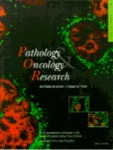Kuncová K, Janda A, Kasal P, Zámečník J. Pathol Oncol Res. 2009 Dec;15(4):605–14. Epub 2009 Mar 20. IF: 1.16

Abstract:
Distinction between grade II ependymomas and anaplastic ependymomas based on histopathological examination solely is problematic and, therefore, the management of intracranial ependymomas remains controversial. The aim of this study was to conduct a systematic review (SR) and meta-analysis (MA) of data published on immunohistochemical prognostic markers (IPM) in intracranial ependymomas (IE), and to establish an evidence-based perspective on their clinical value. Following the extensive search based on a strictly defined group of key words, 30 studies reporting results on IPM in IE were identified. Due to a pronounced inter-study heterogeneity, only 14 publications fulfilled the criteria for inclusion into SR. From the total of 67 immunohistochemical markers, 18 were found to correlate with prognosis. However, owing to inadequate data publishing, MA could be performed only with data on proliferation marker MIB-1 (Ki-67) from 5 publications, including 337 patients: The pooled hazard ratio for overall survival was 3.16 (95% confidence interval = 1.96–5.09; p < 0.001) implicating that patients suffering from tumors with higher immunohistochemical expression of MIB-1 had a significantly worse outcome. Marked inter-study heterogeneity and incomplete data publishing in primary studies significantly limited extent of the SR, and the possibility of performing MA. Although the prognostic impact of MIB-1 immunoexpression in IE could be confirmed, there remains lack of further reliable IPM that could be used in routine diagnosis. We encourage to search for new, useful markers, as well as to standardize lab-techniques and data interpretation algorithms across laboratories in order to increase data compatibility.
-az-
